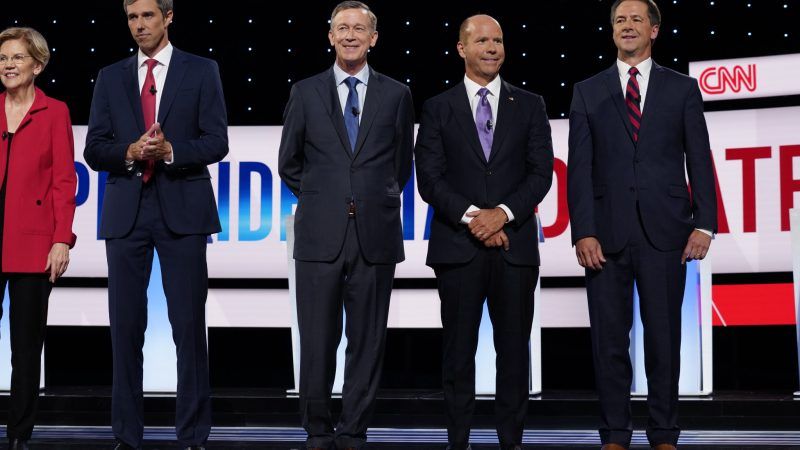Delaney on Medicare for All: 'This Isn't About Health Care, This Is an Anti-Private Sector Strategy'
The former Maryland congressman criticized the progressive wing of the Democratic Party for embracing such expansive government involvement.

Former Maryland Congressman John Delaney argued during Tuesday night's Democratic primary debate in Detroit that his opponents' support for Medicare for All "isn't about health care, this is an anti-private sector strategy."
Insofar as some of his opponents support eradicating private health insurance, he's not wrong. Sen. Bernie Sanders (D–Vt.), who has defended eliminating private health insurance in the past, did not push back on CNN moderator Jake Tapper's statement that Medicare for All would "take private health insurance away from over 150 million Americans." Instead, Sanders used the fact that the health care industry makes "tens of billions in profit" as evidence that the current system is dysfunctional, even though corporate profits are relatively small in the context of the entire U.S. health care system. Sen. Elizabeth Warren (D–Mass.), who also supports eliminating private insurance, described the business model of private health insurance companies as "taking as much money as you can in premiums and pay out as little as possible in health care coverage."
In response, Delaney criticized Medicare for All. While the former congressman didn't focus on the roughly $32 trillion cost of the program, he did argue that it would restrict choice. He told the Detroit debate audience that he didn't want the Democratic Party to "be the party of subtraction, and telling half the country, who has private health insurance, that their health insurance is illegal."
Instead, Delaney favors universal catastrophic coverage, which means the government would provide a certain type of insurance to everyone under the age of 65. This insurance would cover major, unexpected medical ailments. For other procedures, people can use supplemental private insurance, pay out of pocket, or if they are below a certain income threshold, qualify for additional government assistance. This form of health insurance is the model Singapore uses, a country with the lowest government health care spending per capita in the developed world. Under this system, workers could opt out and remain on their more comprehensive employer-sponsored insurance, although Delaney has proposed eliminating the tax exclusion for employer health plans.
Delaney's plan would rein in some perceived excesses of the current private health insurance system by moving away from health insurance as the main way to pay for health care and instead make it a way to manage the risk of high-cost medical ailments. That said, the option of private insurance would still be there for patients.
The critical rhetoric from Sanders and Warren about profit in the health care system suggests they are not interested just in achieving universal health care, because, as Delaney demonstrated Tuesday, there are other ways to achieve it.
